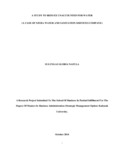A STUDY TO REDUCE UNACCOUNTED FOR WATER (A CASE OF NZOIA WATER AND SANITATION SERVICES COMPANY)
Abstract
Water is an important natural resource, indispensable for life and also the backbone of growth
and prosperity for mankind. Kenya is a water scarce country with renewable fresh water per
capita at 647m
3 against the United Nations recommended minimum of 1,000m
3
. Despite the
efforts made by the Government of Kenya, Unaccounted-for-Water (UFW) is still high, currently
standing at 49%. The overall objective for this study was to assess the strategies for reducing
UFW in water supply systems. The scope focused in identifying areas for improving the water
supply systems at NZOWASSCO. The target population was 148 employees. Data was collected
through questionnaires and analyzed using Statistical Package for Social Sciences (SPSS).
Descriptive and inferential statistics were used to present the results. The research findings
indicate that majority of employees working in water supply systems are in operations level,
considering that majority are diploma holders, their capacity should be enhanced. The research
confirmed that on average, the level of Unaccounted-for-Water at NZOWASSCO was at 45%,
this is in concurrence with the 2010 Impact Report by WASREB. It was further established that
implementation of appropriate strategies to reduce UFW enables water supply systems to serve
more customers for longer periods and thus WSPs realize high revenue. It is recommended that;
WSPs should put in place measures to reduce levels of illegal water connections, vandalism and
customer billing errors. Therefore, sustainable resource utilization, monitoring and control
measures and improvement of existing regulatory mechanisms were found to be instrumental in
enhancing efficiency of water supply systems

